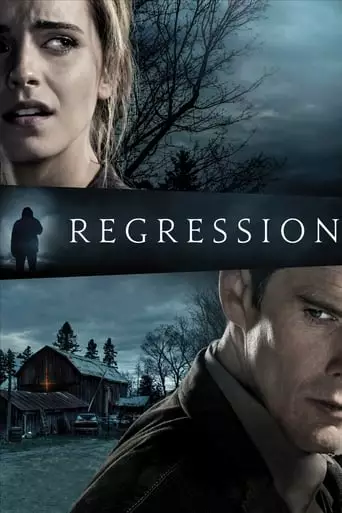
Regression (2015) Watch Online Free
Minnesota, 1990. Detective Bruce Kenner investigates the case of young Angela, who accuses her father, John Gray, of an unspeakable crime. When John unexpectedly and without recollection admits guilt, renowned psychologist Dr. Raines is brought in to help him relive his memories and what they discover unmasks a horrifying nationwide mystery.
Regression is a 2015 psychological thriller directed by Alejandro Amenábar, featuring Ethan Hawke and Emma Watson in leading roles. Set in 1990 Minnesota, the film follows Detective Bruce Kenner (Hawke) as he investigates the case of Angela Gray (Watson), a young woman who accuses her father, John (David Dencik), of sexual abuse. The case becomes more complex when Angela claims that the abuse was part of a satanic ritual, leading Kenner to delve into the phenomenon of satanic ritual abuse that was prevalent in the late 1980s and early 1990s.
As Kenner investigates, he encounters Dr. Raines (David Thewlis), a psychologist specializing in repressed memories. Through hypnosis, Dr. Raines uncovers repressed memories in Angela, suggesting that she was part of a satanic cult. This revelation leads to a series of confessions from other individuals, all implicating themselves in the cult’s activities. However, as the investigation progresses, Kenner begins to question the validity of these confessions and the reliability of repressed memories, leading him to a shocking conclusion about the true nature of the events.
Themes and Analysis
Regression explores themes of memory, perception, and the moral complexities of human behavior. The film delves into the concept of repressed memories and the potential for suggestion in therapeutic settings, highlighting the fragility of human memory and the ease with which false memories can be implanted. This exploration raises ethical questions about the responsibility of mental health professionals in guiding patients through traumatic recollections.
The narrative structure of Regression is methodical, building tension through a series of investigative steps that lead to a climactic revelation. The film employs a muted color palette and atmospheric cinematography to create a somber and suspenseful mood, effectively immersing the audience in the psychological turmoil of the characters.
The performances are commendable, with Ethan Hawke delivering a nuanced portrayal of a detective grappling with his own beliefs and the unsettling nature of the case. Emma Watson’s performance as Angela is compelling, capturing the vulnerability and complexity of her character. David Thewlis provides a strong supporting role as Dr. Raines, adding depth to the narrative’s exploration of memory and suggestion.
Impact of the Movie
Upon its release, Regression received generally negative reviews from critics. Review aggregator website Rotten Tomatoes reported a 14% rating, based on 42 reviews, with a consensus stating, Regression boasts a pair of eminently likable leads – neither of whom are able to dislodge the movie from the mire of psychological thriller mediocrity.
On Metacritic, the film has a score of 32 out of 100, indicating generally unfavorable reviews.
Despite the critical reception, Regression performed moderately well at the box office, grossing $17.7 million worldwide against a budget of $15 million. The film’s exploration of the satanic panic era and its psychological themes sparked discussions about the nature of memory and the potential for mass hysteria.
After viewing Regression, you may experience a sense of unease and contemplation. The film’s exploration of memory and suggestion may prompt you to reflect on the reliability of your own recollections and the influence of external factors on personal history. The somber tone and psychological depth may leave you with lingering questions about the nature of truth and the complexities of the human mind. While the film’s critical reception was mixed, its thought-provoking themes and atmospheric storytelling offer a compelling experience for those interested in psychological thrillers.
